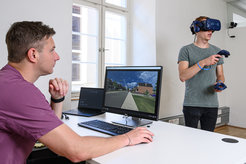Virtual Reality Breaks New Ground in Criminological Research
Article about MAXLab Freiburg in Germany’s P.M. magazine
An article in the October issue of Germany’s P.M. magazine focuses on criminological research conducted at MAXLab Freiburg, the virtual reality (VR) lab at the Max Planck Institute for the Study of Crime, Security and Law.

In "Crime in the Simulator", author Joshua Kocher describes the problem criminologists have because they are usually never present when a crime is committed. In the past, they've relied on interviews or questionnaires to understand the behavior of criminals. "This method only ever allows a retrospective view of the event; emotions and thought processes during the commission of a crime cannot be mapped realistically in hindsight," says Jean-Louis van Gelder, director at the Max Planck Institute and head of the Department of Criminology. At MAXLab Freiburg, which opened about a year and a half ago, Jean-Louis and his team are therefore taking a different approach: They are using VR to understand how criminal behavior occurs.
One of the Freiburg team's scientific endeavors is the "Virtual Burglary Project." For this research project, virtual environments of residential areas were created in order to study burglar behavior. The special feature: The study is not only conducted with test persons in MAXLab Freiburg but also in prisons with convicted burglars. The incarcerated "experts" explore the 3-D residential neighborhood as if they were about to commit a burglary. "With VR, we can directly observe the perpetrators as they carry out their actions," Jean-Louis is quoted as saying. The researchers record the burglars' line of sight, measure sweat output, monitor heart rates, etc.
During the first phase of their research, van Gelder and his colleagues first had to prove that burglars make the same decisions in the virtual environment that they would in real life – in order to demonstrate that research with VR is meaningful at all. Jean-Louis' fellow researcher Claire Nee at the University of Portsmouth succeeded in doing just that in 2015. In the next phase of the project, van Gelder and his team investigated how different situational factors (e.g., lighting, noise) influence burglars' decisions to commit a break-in. For phase three, more than 160 inmates in four prisons in the USA were sent on virtual burglary "tours". The results are still being analyzed and are expected to provide an unprecedented level of detail about burglary behavior. “If we can better understand burglars' decision-making processes and behavior, we can improve crime prevention in the future. Virtual reality will change criminological research in a groundbreaking way," the scientists are certain.
P.M. is a Hamburg based magazine that showcases scientific topics for benefit of the general public. The magazine was launched in 1978 and has an estimated circulation of over 100,000 copies.











